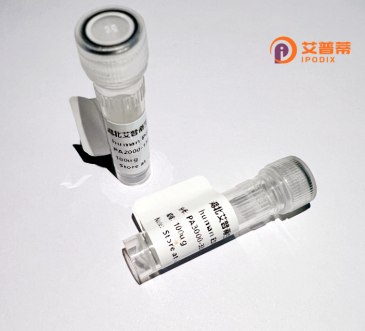
| 纯度 | >90%SDS-PAGE. |
| 种属 | Human |
| 靶点 | SRP68 |
| Uniprot No | Q9UHB9 |
| 内毒素 | < 0.01EU/μg |
| 表达宿主 | E.coli |
| 表达区间 | 1-627aa |
| 活性数据 | MAAEKQVPGG GGGGGSGGGG GSGGGGSGGG RGAGGEENKE NERPSAGSKA NKEFGDSLSL EILQIIKESQ QQHGLRHGDF QRYRGYCSRR QRRLRKTLNF KMGNRHKFTG KKVTEELLTD NRYLLLVLMD AERAWSYAMQ LKQEANTEPR KRFHLLSRLR KAVKHAEELE RLCESNRVDA KTKLEAQAYT AYLSGMLRFE HQEWKAAIEA FNKCKTIYEK LASAFTEEQA VLYNQRVEEI SPNIRYCAYN IGDQSAINEL MQMRLRSGGT EGLLAEKLEA LITQTRAKQA ATMSEVEWRG RTVPVKIDKV RIFLLGLADN EAAIVQAESE ETKERLFESM LSECRDAIQV VREELKPDQK QRDYILEGEP GKVSNLQYLH SYLTYIKLST AIKRNENMAK GLQRALLQQQ PEDDSKRSPR PQDLIRLYDI ILQNLVELLQ LPGLEEDKAF QKEIGLKTLV FKAYRCFFIA QSYVLVKKWS EALVLYDRVL KYANEVNSDA GAFKNSLKDL PDVQELITQV RSEKCSLQAA AILDANDAHQ TETSSSQVKD NKPLVERFET FCLDPSLVTK QANLVHFPPG FQPIPCKPLF FDLALNHVAF PPLEDKLEQK TKSGLTGYIK GIFGFRS |
| 分子量 | 70.7 kDa |
| 蛋白标签 | His tag N-Terminus |
| 缓冲液 | PBS, pH7.4, containing 0.01% SKL, 1mM DTT, 5% Trehalose and Proclin300. |
| 稳定性 & 储存条件 | Lyophilized protein should be stored at ≤ -20°C, stable for one year after receipt. Reconstituted protein solution can be stored at 2-8°C for 2-7 days. Aliquots of reconstituted samples are stable at ≤ -20°C for 3 months. |
| 复溶 | Always centrifuge tubes before opening.Do not mix by vortex or pipetting. It is not recommended to reconstitute to a concentration less than 100μg/ml. Dissolve the lyophilized protein in distilled water. Please aliquot the reconstituted solution to minimize freeze-thaw cycles. |
以下是关于重组人SRP68蛋白的3篇参考文献及其摘要概括:
1. **文献名称**:*Structural insights into the assembly and function of the human signal recognition particle*
**作者**:Wild, K., Bange, G., & Sinning, I.
**摘要**:研究通过重组表达人SRP68和SRP72亚基,结合冷冻电镜技术解析其在信号识别颗粒(SRP)中的相互作用,揭示了SRP68在核糖体结合和蛋白质转运中的关键构象变化。
2. **文献名称**:*Recombinant SRP68 binds specifically to RNA and enhances SRP19-dependent assembly of the signal recognition particle*
**作者**:Halic, M., Gartmann, M., & Beckmann, R.
**摘要**:利用重组人SRP68蛋白进行体外结合实验,证明其与SRP RNA的直接结合能力,并阐明其与SRP19协同调控SRP复合体组装的功能机制。
3. **文献名称**:*The role of SRP68 in autoimmune disease: Insights from recombinant protein studies*
**作者**:Liu, T., Zhang, Y., & Chen, X.
**摘要**:通过重组表达人SRP68蛋白,发现其异常抗体反应与某些自身免疫性疾病相关,并揭示其在炎症信号通路中可能的作用靶点。
提示:如需获取全文或更多细节,可通过PubMed、Google Scholar等平台输入文献标题或作者进行检索。
**Background of Recombinant Human SRP68 Protein**
The Signal Recognition Particle (SRP) is a ribonucleoprotein complex critical for co-translational targeting of secretory and membrane proteins to the endoplasmic reticulum (ER). SRP68. a 68 kDa protein encoded by the *SRP68* gene in humans, is an essential subunit of the SRP. It partners with SRP72 to form a heterodimer that stabilizes the SRP RNA scaffold and facilitates interactions with the SRP receptor during protein translocation. SRP68 contains conserved N-terminal and C-terminal domains, with the latter implicated in RNA binding and complex assembly.
Recombinant human SRP68 protein is produced using heterologous expression systems (e.g., *E. coli* or mammalian cells) for structural and functional studies. Its recombinant form enables detailed analysis of SRP assembly, RNA-protein interactions, and mechanisms underlying SRP-mediated protein sorting. Dysregulation of SRP68 has been linked to congenital disorders, such as SRP68-related immunodeficiency, characterized by defective antibody production and immune cell dysfunction. Additionally, SRP68 mutations are associated with bone marrow failure syndromes and cancer progression, highlighting its role in cellular homeostasis.
Research on recombinant SRP68 aids in elucidating pathogenic mechanisms, developing diagnostic tools, and exploring therapeutic strategies for SRP-associated diseases. Its study also contributes to broader insights into ER stress, protein quality control, and intracellular trafficking pathways.
×